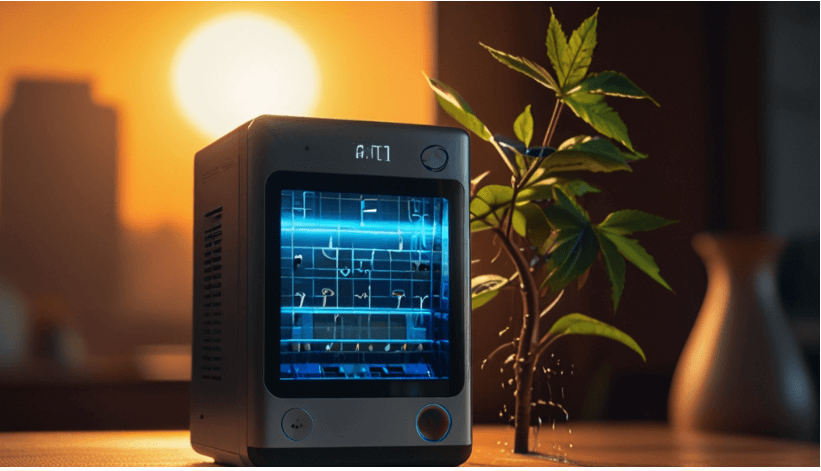Summer is a time for beach trips, barbecues, and sunshine. However, the relentless heat can sometimes dampen our spirits and affect our productivity. Fortunately, artificial intelligence (AI) is stepping up with innovative solutions to help us beat the summer heat and make the most of the season. From smart home cooling systems to personalized hydration reminders, here’s how AI is transforming our summer experience.
Smart Home Cooling Systems
One of the most significant applications of AI in combating the summer heat is through smart home cooling systems. These systems use AI algorithms to optimize cooling efficiency, ensuring that your home remains comfortable while minimizing energy consumption.
Smart Thermostats
AI-powered smart thermostats, like the Nest Learning Thermostat, learn your schedule and preferences over time. They automatically adjust the temperature when you’re away, saving energy and reducing costs. These devices also integrate with weather forecasts, anticipating temperature changes and adjusting cooling settings accordingly.
AI-Powered Air Conditioners
Modern air conditioners equipped with AI technology, such as LG’s AI ThinQ series, can analyze room conditions and adjust cooling power based on occupancy and humidity levels. Some models even have voice control and can be managed remotely via smartphone apps, providing convenience and energy efficiency.
Personalized Hydration Reminders
Staying hydrated is crucial during the summer months, and AI is here to help. AI-driven hydration apps and smart water bottles ensure you drink enough water throughout the day.
Hydration Apps
Apps like WaterMinder and Plant Nanny use AI to calculate your daily water needs based on factors like weight, activity level, and weather conditions. These apps send personalized reminders to drink water, helping you maintain optimal hydration.
Smart Water Bottles
Smart water bottles, such as HidrateSpark, track your water intake and sync with hydration apps. They use sensors to monitor how much water you consume and glow to remind you when it’s time to drink more. Some models even connect to fitness trackers, providing a comprehensive overview of your health and hydration.
Wearable Technology for Health Monitoring
Wearable technology has become increasingly sophisticated, with AI playing a pivotal role in monitoring and managing health, especially during the hot summer months.
Fitness Trackers
Fitness trackers like Fitbit and Apple Watch use AI to monitor your heart rate, activity level, and even your exposure to UV rays. These devices provide insights into how your body responds to heat and offer personalized advice on how to stay cool and safe.
UV Exposure Monitoring
Excessive sun exposure can lead to skin damage and other health issues. AI-powered devices like the QSun wearable UV sensor measure UV radiation and give real-time advice on sun protection. These devices can recommend when to apply sunscreen, seek shade, or wear protective clothing.
AI-Driven Summer Fashion
AI is revolutionizing summer fashion by helping consumers choose clothing that keeps them cool and comfortable.
Smart Fabrics
Innovative companies are developing smart fabrics embedded with AI technology. These fabrics can regulate temperature, wick away moisture, and even change color in response to heat. Brands like Ministry of Supply are incorporating phase-change materials and AI algorithms to create clothing that adapts to your body temperature.
Virtual Styling Assistants
AI-powered virtual stylists, such as those offered by platforms like Stitch Fix, analyze your preferences and the current weather conditions to recommend the perfect summer outfits. These assistants ensure you stay stylish and comfortable no matter how high the temperature climbs.
Sustainable Cooling Solutions
AI is also contributing to the development of sustainable cooling solutions, reducing our reliance on energy-intensive air conditioning.
AI in Architecture
Architects are using AI to design buildings with better natural ventilation and cooling. By analyzing environmental data, AI helps create structures that stay cool naturally, reducing the need for artificial cooling systems. This approach not only keeps buildings comfortable but also lowers energy consumption and greenhouse gas emissions.
AI-Optimized Energy Management
AI-driven energy management systems optimize the use of renewable energy sources like solar power for cooling purposes. These systems predict energy demand and adjust the distribution of power, ensuring efficient and sustainable cooling during peak summer months.
Conclusion
As temperatures rise, AI is proving to be a valuable ally in helping us beat the summer heat. From smart home cooling systems and personalized hydration reminders to wearable health monitors and sustainable cooling solutions, AI is enhancing our ability to stay cool, healthy, and comfortable. Embrace these AI-driven innovations and enjoy a smarter, cooler summer.




